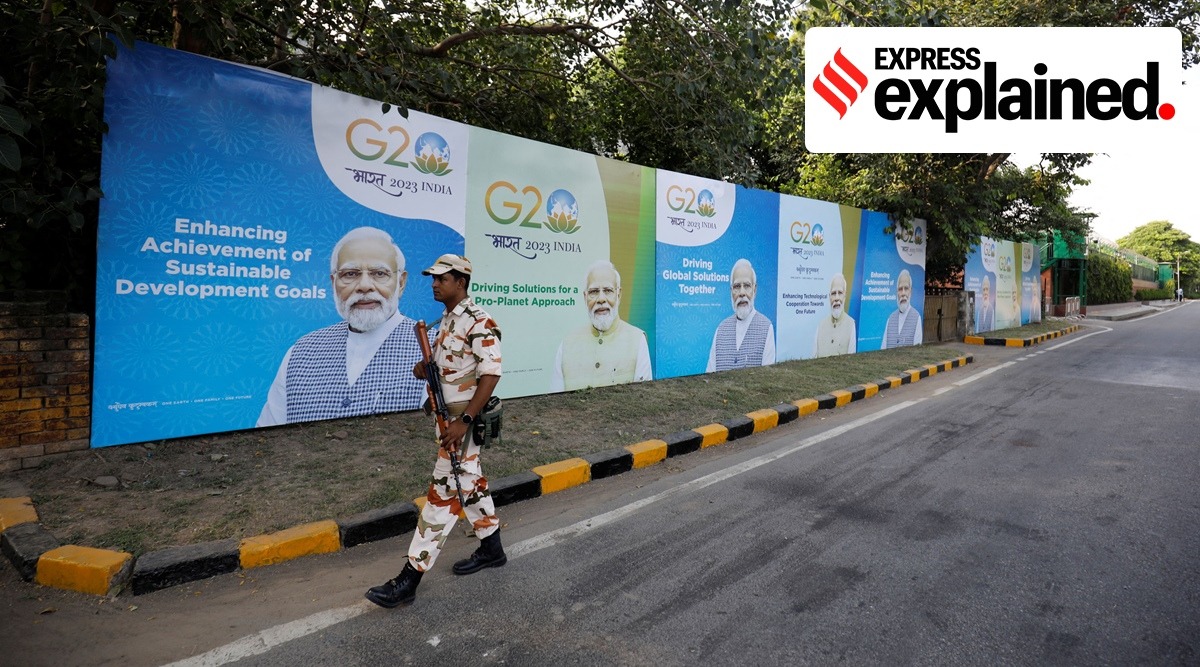How global events put terrorism on G20’s agenda
While primarily focussed on economic issues, terrorism, specifically terror financing, has also featured prominently in the G20’s agenda since 2015.
 A security force personnel patrols past hoardings featuring India's Prime Minister Narendra Modi along an empty road ahead of the G20 Summit in New Delhi, India, September 8, 2023. (Photo: Reuters/Amit Dave)
A security force personnel patrols past hoardings featuring India's Prime Minister Narendra Modi along an empty road ahead of the G20 Summit in New Delhi, India, September 8, 2023. (Photo: Reuters/Amit Dave) India has consistently pushed for global consensus on fighting terrorism and emphasised on a “uniform, unified and zero tolerance approach”. However, at the G20 the needle on terrorism decisively moved only in 2015 post the Paris attacks.
As top world leaders gather in New Delhi for the G20 summit, India will hope that a dialogue on the issue of terrorism leads to a consensus on how the global powers can cooperate to deal with the menace and, in particular, address India’s concerns on certain regional threats.
How focused has G20 been on terrorism?
G20 is a grouping on 20 largest economies in the world that came together in 1999 largely for issues related to the global economy, such as international financial stability, climate change mitigation and sustainable development. Thus, it has never been a forum that was primarily concerned with security issues of security.
In fact, in the first two ministerial conferences (G20 started having summits only from 2008 onwards), terrorism did not even find a mention.
However, following the events of September 11, 2001, as global terrorism reached American shores, the attention of international powers turned to the menace that had long impacted India and certain other regions in West and South Asia. The G20 Meeting of Finance Ministers and Central Bank Governors held in November that year mentioned “terror”, “terrorist” and “terrorism” a total of 29 times in its communique.
This was largely a result of a push by the US following the 9/11 attacks as it felt need for an international cooperation, specially on terror financing. This resulted in strengthening of Financial Action Task Force (FATF) and certain other arms of international financial bodies.
“Terrorism was never really a core topic for the G20 when its first summit took place in 2008. Being a predominantly economic forum, security debates within it were almost frowned upon. However, Turkey’s G20 presidency in 2015 can be seen as a pivotal moment when Ankara decided that for its national, and economic interest, it was an important issue to raise,” Kabir Taneja, a fellow with the Strategic Studies programme at Observer Research Foundation, told The Indian Express.
How has G20’s approach to terrorism evolved over the years?
Following the 2001 communique, there were fewer mentions of terrorism in the communiques until the 2015 summit in Turkey, when dedicated documents started being produced in the summit. In fact, a 2002 meet, held in New Delhi, had only three mentions of the word “terror” or “terrorism” and no significant assertion beyond “renewed commitment” to combating terror financing.
The Turkey Summit once again picked the issue up, this time, in the aftermath of the Paris attack and the rise of Islamic State. The summit communique was significant for expressing “resolve in the fight against terrorism in all its forms and wherever it occurs”.
According to a paper by Katherine Yampolsky, research analyst with G20 Research Group at University of Toronto, G20 leaders have made a total of 48 commitments on terrorism between 2008 and 2020 and dedicated a total of 6,469 words to terrorism in their public communiqués, for an average of 462 at each summit.
“There were none at the summits in April 2009 at London and in 2014 at Brisbane, and represented as high as 5% at the 2009 Pittsburgh Summit, the 2011 Cannes Summit, the 2015 Antalya Summit and the 2017 Hamburg Summit. The highest word count came in 2017 at Hamburg, with 1,900 words. This was followed by a decline in 2018 at Buenos Aires, with only 64 words dedicated to terrorism, representing 1% of the total words. There was an increase to 721 words at the most recent regular summit, in 2019 at Osaka, which, at 11%, is the highest percentage of total words dedicated to terrorism in a summit communiqué to date,” the paper said.
“From 2008 to 2019, the G20 leaders focused on condemning the act of terrorism and addressing terrorist financing. In 2017 at Hamburg, the G20 leaders released their “Statement on Countering Terrorism.” At Osaka in 2019 they included discussions on preventing internet exploitation for terrorism and violent extremism,” it added.
The paper also studied six commitments on terrorism for compliance and found that “the four commitments with low binding verbs (such as “reiterate,” “remain committed” and “will continue to”) averaged of 87%, compared to 50% for the one commitment with a highly binding phrase (“we are committed to realizing”).”
How has India been placed in this discussion?
India has been pushing its concerns on terrorism in various international forums including the G20, even though the group has achieved very little in this regard.
Dr Sameer Patil, senior fellow, Centre for Security, Strategy and Technology and Deputy Director, ORF, Mumbai, believes that till date, the G20 has hardly achieved anything on counter-terrorism beyond rhetoric.
“In the last one year, however, India has been able to bring G20 focus back on it. It has been able to articulate the linkages between global economy and terrorist financing. The July G20 conference organised by the Ministry of Home Affairs on impact of new-age technologies on security was commendable, given that the grouping is largely focused on economic cooperation and governance,” Patil said.
In the past one year India has hosted three conferences at the level of Interpol, the UN and the No Money for Terror Conference where challenges of combating terror financing and propagation due to emerging technologies were discussed.
Is G20 the right forum to address terror concerns?
According to Taneja, since the nature of terrorism itself is changing, even a forum like the G20 cannot completely ignore it.
“Terrorism today has evolved rapidly, along with the global order, specifically over the past decade. It’s not just about groups like Al Qaeda or the post-9/11 ‘war on terror’ agenda but how we see terrorism and extremism in an era of geoeconomics which encompasses everything from security of connectivity projects to security of digital infrastructure and the cyber space. From ports to cryptocurrency, terrorism utilises every available infrastructure today,” Taneja said.
He hopes that issues like Afghanistan, which have now fallen from international agendas, find some space from an Indian viewpoint on both economic and political security aspects.
“However, G20 is not the correct forum to expect practical or tactical returns on regional or national terrorism related challenges. But it does not stop New Delhi from raising any issue it deems critical to its economic blueprint towards its aim to become a $5 trillion economy,” he said.
What can India expect out of the G20 on the issue?
India has already raised issues of terror financing in the two G20 conferences of Foreign Ministers’ meet in March and the conference organised by the MHA. These include threats from “new and emerging technologies for terrorist purposes”, “linkages between terrorism and organized crime”, “denying terrorist groups safe haven”, “securing digital public infrastructure”, “challenges posed by the darknet and crypto-currencies” and “collective measures to counter money laundering and terrorism financing”.
According to Patil, India would hope that some of the concerns raised by it will figure in the summit communique as well.
“India knows that this forum can more easily come to an agreement on counter-terror financing than say dealing with terror safe havens. So for the past one year, through various international forums, it has been shaping the narrative on choking finances of terror groups and the importance of it for global economy,” Patil said.
- 01
- 02
- 03
- 04
- 05






































